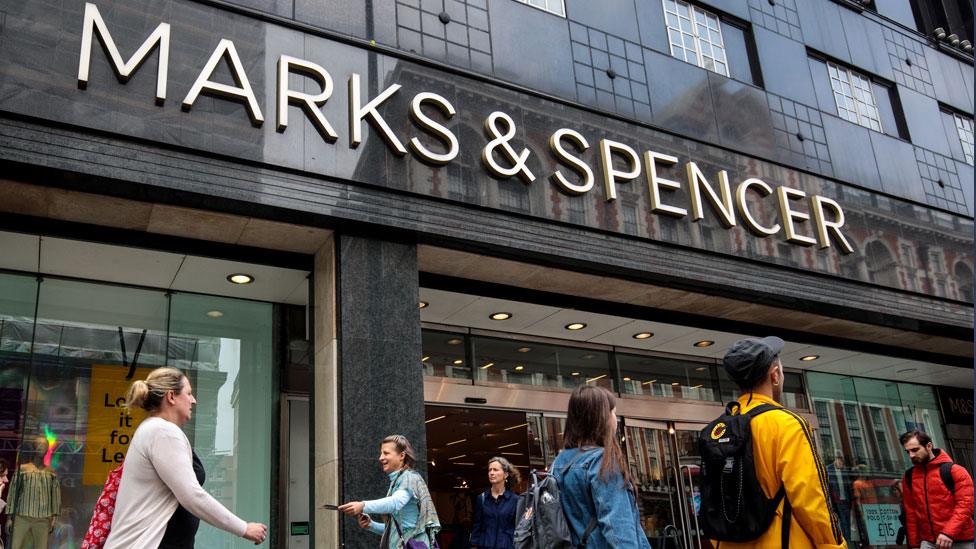John Lewis Christmas advert: Venus flytrap divides opinion as TV ads get festive
- Published
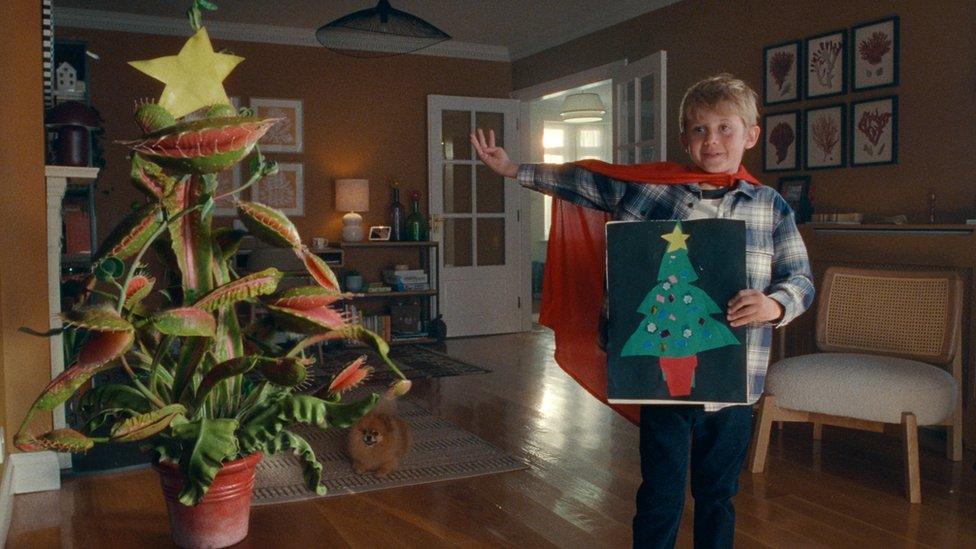
A young boy tries to grow the perfect Christmas tree in John Lewis's advert
It's still only November, but the Christmas TV adverts are coming in thick and fast, bringing a sprinkling of festivity to our screens.
John Lewis has become the latest big name brand to beam its festive message into UK homes.
The advert, released on Thursday, tells the tale of a little boy and a giant Venus flytrap.
Opinion was split on social media, with some calling it "scary" but others saying it offered light relief.
One user on X said the advert was "a disappointment", while another asked whether someone in the John Lewis creative department had "basically watched Little Shop Of Horrors" before pitching for this year's ad, referring to the musical about a bloodthirsty plant.
However, others were more positive, saying they enjoyed the fact the advert was uplifting at a difficult time.
Allow X content?
This article contains content provided by X. We ask for your permission before anything is loaded, as they may be using cookies and other technologies. You may want to read X’s cookie policy, external and privacy policy, external before accepting. To view this content choose ‘accept and continue’.
Charlotte Lock, customer director at John Lewis, told the BBC the retailer had "asked for something that moved us on from last year and was different".
Retail expert Catherine Shuttleworth said it will "be hoping the theme of family values works".
"The overall theme in this year's Christmas adverts is glitz, fame and fun," Ms Shuttleworth added. "John Lewis has opted instead for a vision of a modern family Christmas. Let's see if it works."
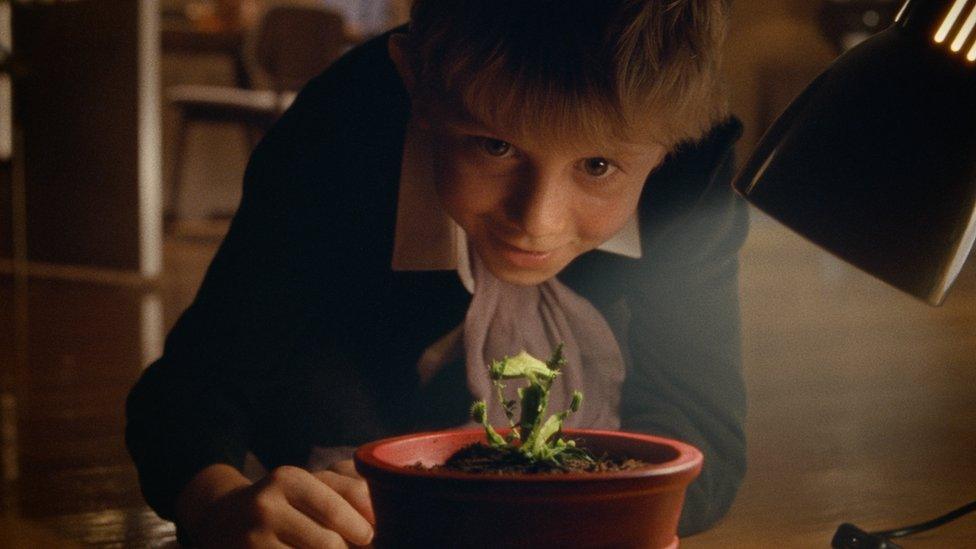
Alfie, the star of John Lewis' ad, nurtures a plant from a seed
Set to a track called Festa sung by opera legend Andrea Bocelli, the advert shows a little boy, Alfie, who plants his own Christmas tree - only to find it grows into a carnivorous Venus flytrap called Snapper.
But his family eventually embrace the idea of a new tradition, and even enlist the help of Snapper to open their presents on Christmas morning.
Whereas last year's ad was toned down to reflect the cost of living crisis, this year's advert focuses on family and evolving traditions.
"It's not the tradition itself that matters, it's how it brings together families and loved ones," Ms Lock said.
Star power
Many other retailers have spent heavily on recruiting famous faces to front their campaigns.
Michael Bublé and Rick Astley to Sophie Ellis-Bextor are some of the A-list stars fronting this year's ads.
Sascha Darroch-Davies, co-founder of creative music agency DLMDD, said many have gone with celebrities "because they have cultural currency".
"There's not a lot of risk-taking at Christmas. Celebrities are a formula that has worked before," he told the BBC. "It's a tough time for retailers. Many are struggling. They know this is usually a safe bet."
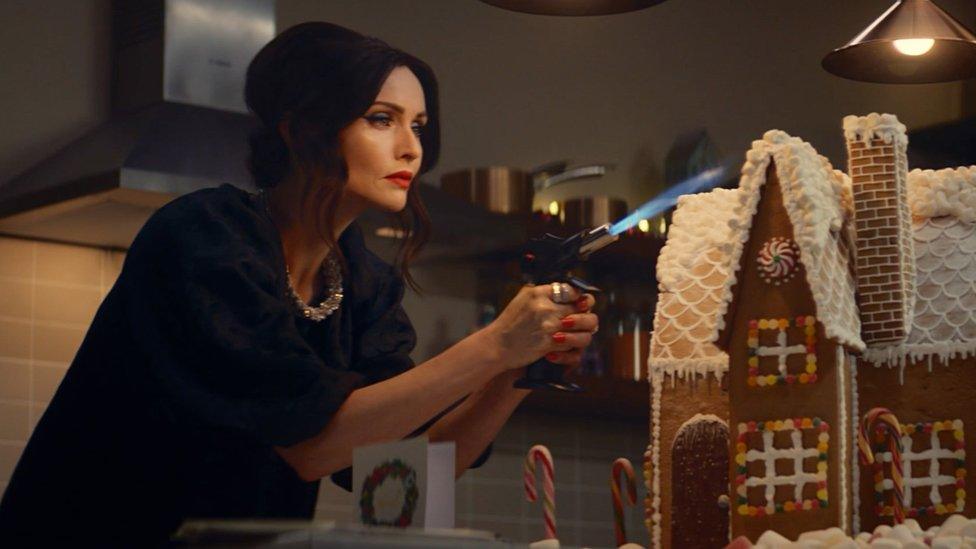
Sophie Ellis-Bextor does away with Christmas traditions in the M&S clothing ad
Marks and Spencer was quick off the mark with its Christmas food advert, which sees the return of Dawn French as a festive fairy.
She is joined by Hollywood actors and Wrexham football club co-chairmen Rob McElhenney and Ryan Reynolds, who voice 'the Mittens' in the six-part ad.
The trio dance around the house, ending up in the dining room, where a table is seen groaning under the weight of an M&S Christmas feast.
M&S's Christmas clothing and home advert also recruits well-known faces including actors Zawe Ashton and Hannah Waddingham, Queer Eye presenter Tan France, and singer Sophie Ellis-Bextor.
Whereas John Lewis focuses on changing traditions, M&S's ad suggests people should simply do away with Christmas traditions they no longer love.
However, M&S was forced to apologise after an outtake from the advert - showing red, green and silver hats burning in a fireplace - was criticised by some who said it resembled the colours of the Palestinian flag.
The company removed the photo, which it had posted on Instagram, and said the advert was filmed in August, before the latest Israel-Gaza conflict began.
Some might argue that controversies don't matter, and indeed might help a company, by getting its advert talked about. But Sophie Lewis, chief strategy officer at creative company M&C Saatchi, disagrees.
"I don't think controversy at Christmas is ever advisable," she told the BBC. "And I do not think for one second that M&S were courting it in the case of the ad they pulled, and then re-edited."
Ms Lewis said time would tell whether, and to what extent, the row has affected M&S.
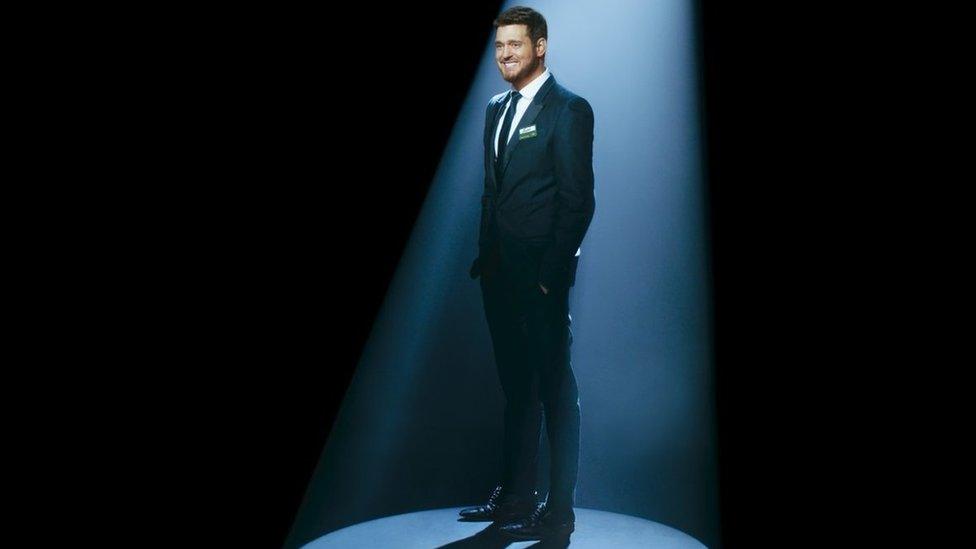
Singer Michael Bublé takes on a new role in Asda's advert
Elsewhere, Bublé has been defrosted for Christmas, and is the star of Asda's ad this year.
The crooner takes on the role of Asda's chief quality officer, making the big decisions on what food the nation should eat this Christmas.
Opinion on social media was mostly positive, with some expressing surprise to see that Bublé can act as well as sing. But others felt the ad fell short after the success of Elf last year.
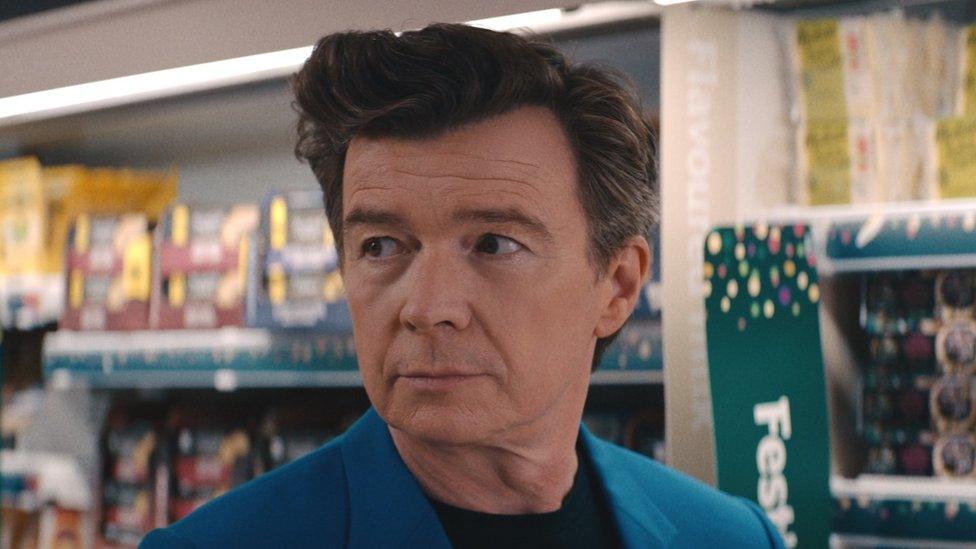
Pop icon Rick Astley is the face of the Sainsbury's advert this year
Not to be outdone, Sainsbury's casts 1980s icon Rick Astley alongside real supermarket workers as they explore what Santa's Christmas dinner would be.
It concludes a huge year for Astley, who also played Glastonbury Festival for the first time in June, leading a mass sing-a-long to some of his classic hits.
The singer achieved internet notoriety through the Rickrolling meme, in which users are pranked when they click on an unrelated link, only to be redirected to his famous song Never Gonna Give You Up.
The hashtag #RickAstley has also accumulated more than 716 million views on the TikTok app.
"Winning over shoppers' hearts and minds is quite challenging in the cost of living crisis so you've got to really find a way to make a people smile," said Ms Shuttleworth.
"Bublé and Rick Astley achieve that. People are wanting to get excited for Christmas, and that's what these ads do."

Toy duo Connie and Trevor star in Argos' Christmas ad
Not all of this year's Christmas adverts have a star line-up.
Argos has shunned celebrities in favour of cartoon duo Connie the doll and Trevor the dinosaur.
And Lidl has gone for the tried and tested formula of recruiting a furry friend - a favourite for retailers at Christmas. Its advert follows a raccoon that goes out of its way to make one little boy's day extra special.
'Making TV history'
Taken as a whole, advertisers are set to spend a record £9.5bn during this festive season, according to new data by the Advertising Association and World Advertising Research Centre.
Whether that will pay off in attracting new customers is "impossible" to tell, says cultural historian Dorothy Hobson.
"But companies would not waste the vast sums of money they spend on making the ads and buying the air space if they were not getting a good return on their outlays," she told the BBC.
Retailers are treading a fine line, she said. Their Christmas adverts are planned months in advance, so it's important they don't have the wrong ambiance when they hit the reality of the everyday lives of their customers.
That's one reason why ads often stick to safe territory, showing empathy and care of others. If they get it right, they can become a major cultural moment.
"They have become a cultural genre in their own right, which means that they are fulfilling their function by making us look forward to them and talk about them," Ms Hobson said.
"And if they are good, they become part of the history of television."

Sign up for our morning newsletter and get BBC News in your inbox.

- Published2 November 2023
